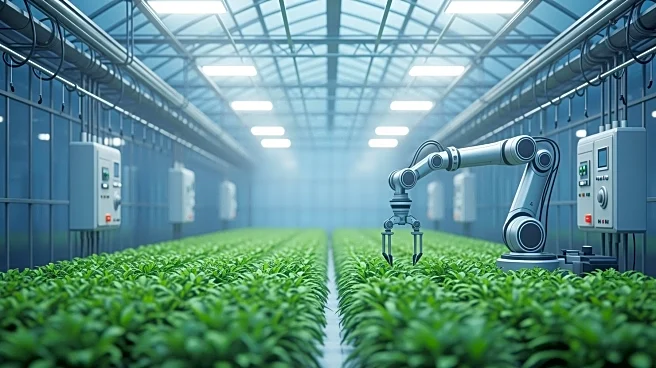What's Happening?
The agricultural sector is increasingly turning to artificial intelligence (AI) to address the challenges posed by climate change, growing global populations, and shrinking resources. Traditional farming
methods, which rely heavily on reactive measures, are proving insufficient in the face of unpredictable weather patterns and resource scarcity. AI offers predictive capabilities that allow farmers to anticipate and mitigate issues such as droughts and pest infestations before they occur. By utilizing data from satellites, sensors, and historical records, AI provides farmers with actionable insights to optimize planting, irrigation, and resource use, thereby enhancing yield and reducing environmental impact.
Why It's Important?
The integration of AI in agriculture is crucial for ensuring food security and sustainable farming practices. As climate change threatens to significantly reduce global crop yields, AI's ability to improve resource efficiency and predict market trends becomes vital. This technology not only helps in maintaining productivity amid labor shortages but also supports small-scale farmers by providing localized weather and pest-risk alerts. The adoption of AI can lead to increased profitability and reduced environmental harm, making it a key component in the future of farming.
What's Next?
For AI to fully transform agriculture, it must become more accessible and affordable, particularly for small farmers who produce a large portion of the world's food supply. Overcoming barriers such as high costs, connectivity issues, and digital literacy is essential. Governments and organizations may need to provide subsidies, open-source tools, and educational programs to facilitate AI adoption. Additionally, ensuring data privacy and promoting regenerative farming practices will be critical in building trust and maximizing the benefits of AI in agriculture.
Beyond the Headlines
The ethical and sustainable use of AI in agriculture involves combining technological insights with farmers' traditional knowledge, rather than replacing it. Developing AI systems that support regenerative practices and ensuring fair access to technology can lead to a more resilient and environmentally friendly agricultural sector. As AI continues to evolve, it holds the potential to revolutionize farming by preventing crises and promoting efficient food production.










